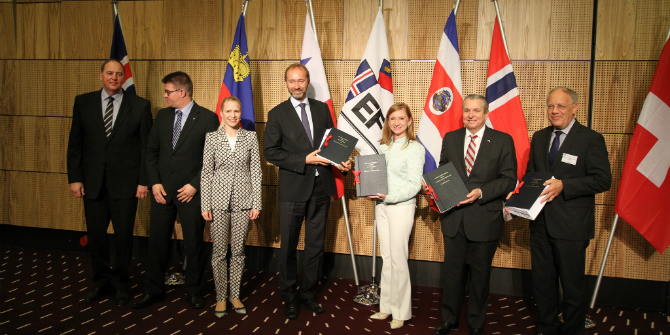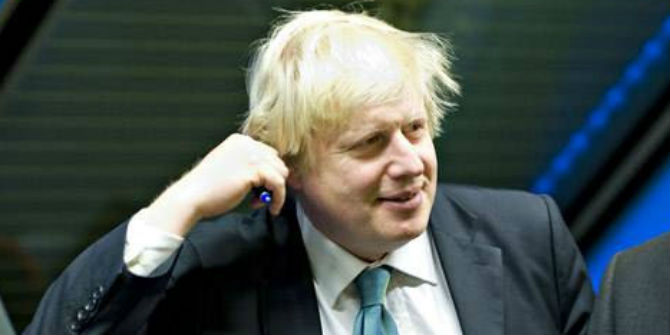

Amid the uncertainty of the Brexit process, one way to address the challenge of securing a degree of continuity in retaining preferential market access beyond the EU would be for the UK to become a member or associate of the European Free Trade Association (EFTA). Cenni Najy (University of Geneva) and David Phinnemore (Queen’s University Belfast) ask whether the UK after Brexit can hope for either membership of or association with EFTA.
The UK government’s plans for Brexit remain largely a work in progress. To date, few details on the proposed scope and intensity of future UK-EU relations have been provided beyond the aspiration to establish ‘a new strategic partnership with the EU, including a wide-reaching, bold and ambitious free trade agreement’.
There is also little clarity on the UK’s proposed trade and economic relations with non-EU countries. Currently, as an EU member, the UK participates in a range of free trade agreements with non-EU countries, both in Europe and in the rest of the world. In the case of a ‘hard Brexit’ and the UK leaving the EU’s customs union, the UK will lose the preferential market access these agreements provide. The government’s White Paper says little on how this situation will be managed other than a reference to striking new trade deals and ‘seeking to achieve continuity’. As regards non-EU European trade partners there is simply a wish for ‘tariff-free trade’ and for ‘cross-border trade … to be as frictionless as possible’.
The negotiation of replacement agreements with each non-EU European and non-European country is an option. However, this will take time and draw significantly on scarce resources. The negotiations will be challenging given the complexity of trade agreements.
One way to address the challenge of securing a degree of continuity in retaining preferential market access with a not insignificant number of existing partners would be for the UK to become a member of the European Free Trade Association (EFTA), an intergovernmental organization of which the UK was a member from 1960-1972 and which today comprises Iceland, Liechtenstein, Norway and Switzerland (the ‘EFTA-4’).
 Image by NHD-INFO, (Flickr), licenced under (CC BY 2.0).
Image by NHD-INFO, (Flickr), licenced under (CC BY 2.0).
As we point out in a recent paper published with Foraus, the Swiss foreign policy think tank, joining EFTA – which serves as a platform for free trade between its members – would allow some continuity to be maintained in UK trade relations with not only the EFTA-4 but also, importantly, other existing non-EU partners.
EFTA membership, far less demanding legally, politically and financially than EU membership, has its attractions.
- First, the UK would secure free trade with the EFTA-4 for most goods albeit with a general exception for agricultural goods. These ties are not insignificant for the The EFTA-4 currently account for 8.53% of UK exports; Germany accounts for 10.2%.
- Second, joining EFTA would provide access to free trade agreements with 38 countries covering c900 million consumers thus limiting some of the anticipated loss of preferential access to those 50+ markets currently covered by EU trade agreements.
- Third, EFTA is an intergovernmental organisation where decisions are taken by unanimity. EFTA membership would not, therefore, entail a formal pooling or loss of sovereignty.
- Fourth, and related, EFTA would not involve submitting to the jurisdiction of a supranational court or a supranational surveillance system. Despite their titles, the remit of the EFTA Court and EFTA Surveillance Authority extends only to Iceland, Liechtenstein and Norway as participants in the European Economic Area (EEA).
- Fifth, EFTA membership could facilitate the long-term development of the UK’s post-Brexit relations with the EU in that it could pave the way for re-joining the EEA, this time as an EFTA member; currently, EEA membership requires membership of either the EU or EFTA.
- Finally, there would be symbolic value in re-joining EFTA. It would send a positive message to the UK’s international partners that Brexit does not mean that the country is retreating from the international order.
However, EFTA membership would also pose some challenges for the UK. Acceding to the EFTA Convention entails a commitment to establish the free movement of persons with the other EFTA countries. Given the anti-free movement sentiments underpinning the ‘leave’ vote in the 2016 referendum, this is likely to attract popular opposition and be resisted by the UK government. Also, the expectation that states joining EFTA participate in all EFTA’s trade agreements with third countries would limit the UK’s ability to conclude its own trade agreements and so challenge the ‘take back control’ narrative underpinning the government’s approach to Brexit. Potentially contentious too could be some requirements regarding the liberalisation of investment, technical regulations, air/land transport and public procurement.
A further question is where the EFTA-4 would be willing to admit the UK. Some EFTA voices envisage UK accession strengthening the organisation, most notably in trade negotiations with large third countries. However, concerns have also been expressed that UK accession could prove disruptive to the settled organisation of EFTA. The UK might seek to impose its own trade liberalisation agenda and indeed change the whole dynamic of EFTA possibly even turning the organisation into a rival of the EU.
Given that membership of EFTA might not be an optimal solution for all concerned, how then could the UK proceed to develop constructive relations with EFTA and avail of some, at least, of the attractions of membership?
One option would be to seek ‘association’ with EFTA, an arrangement short of membership provided for in the EFTA Convention (art. 56.2). Such an association would draw on the precedent, if not necessarily the form, of the ‘FINEFTA’ association that drew Finland into a close relationship with EFTA from 1961-1985. Association is a notionally flexible concept and could provide for a ‘UKEFTA’ arrangement that would see the UK secure the trade benefits of EFTA membership while not necessarily involving either the same level of political commitment as existing members in matters related to free movement of people and/or accession to all the trade agreements concluded by EFTA. Access to EFTA decision-making would be formally limited and so the association would come with a small loss of formal sovereignty, but this could be limited if a FINEFTA-type institutional arrangement were adopted. Although only an associate, Finland de facto participated in all decisions taken by EFTA.
A UKEFTA association could be a temporary or permanent arrangement; it could also be a dynamic arrangement depending on the preferences of the participants. Either way, it could provide an elegant and relatively swift solution to some of the challenges facing the UK in securing post-Brexit trade agreements with non-EU partners. The combination of continuity and flexibility could prove very valuable as the UK navigates the numerous uncertainties of the Brexit process.
This article gives the views of the authors, and not the position of LSE Brexit, nor of the London School of Economics.
Cenni Najy is a political researcher and currently serves as Senior Policy Fellow at Foraus. He is also teaching assistant in political science at the University of Geneva.
David Phinnemore is Professor of European Politics at Queen’s University Belfast and a Visiting Professor at the College of Europe in Bruges.







Here are a few example articles from EFTA bilateral treaties. I have one important question – scroll to the end:
Canada – Article 39 – Additional Parties
The Parties may invite any State to become a Party to this Agreement. The terms and conditions of the participation by the additional Party shall be the subject of an agreement between the Parties and the invited State.
http://www.international.gc.ca/trade-agreements-accords-commerciaux/agr-acc/eu-ue/efta.aspx?lang=eng#a6
Israel – Article 35
Any State, Member of the European Free Trade Association, may accede to this Agreement, provided that the Joint Committee decides to approve its accession, on such terms and conditions as may be set out in that decision. The instrument of accession shall be deposited with the Depositary.
Mexico – ARTICLE 82
Additional Parties Any State may, upon invitation by the Joint Committee, become a Party to this Agreement. The terms and conditions of the participation by the additional Party shall be the subject of an agreement between the Parties and the invited State
http://www.efta.int/media/documents/legal-texts/free-trade-relations/mexico/EFTA-Mexico%20Free%20Trade%20Agreement.pdf
Here is my question, wouldn’t these mean that the UK would not automatically gain the benefit of the free trade agreements already negotiated by EFTA countries as the FTAs are agreed bilaterally between the current members of EFTA and the third country concerned?
That is, the UK would have to have each one renegotiated? And if one party refused…
Dear Dr Harker,
Thank you for your interest.
Actually, we never wrote that the UK would “automatically” gain the benefit of the free trade agreements already negotiated by EFTA countries.
Please read our paper (p.12-16): https://docs.wixstatic.com/ugd/8749c7_d46373fd8d1f48bbb780fa56cd12e04b.pdf
Best regards,
Cenni Najy